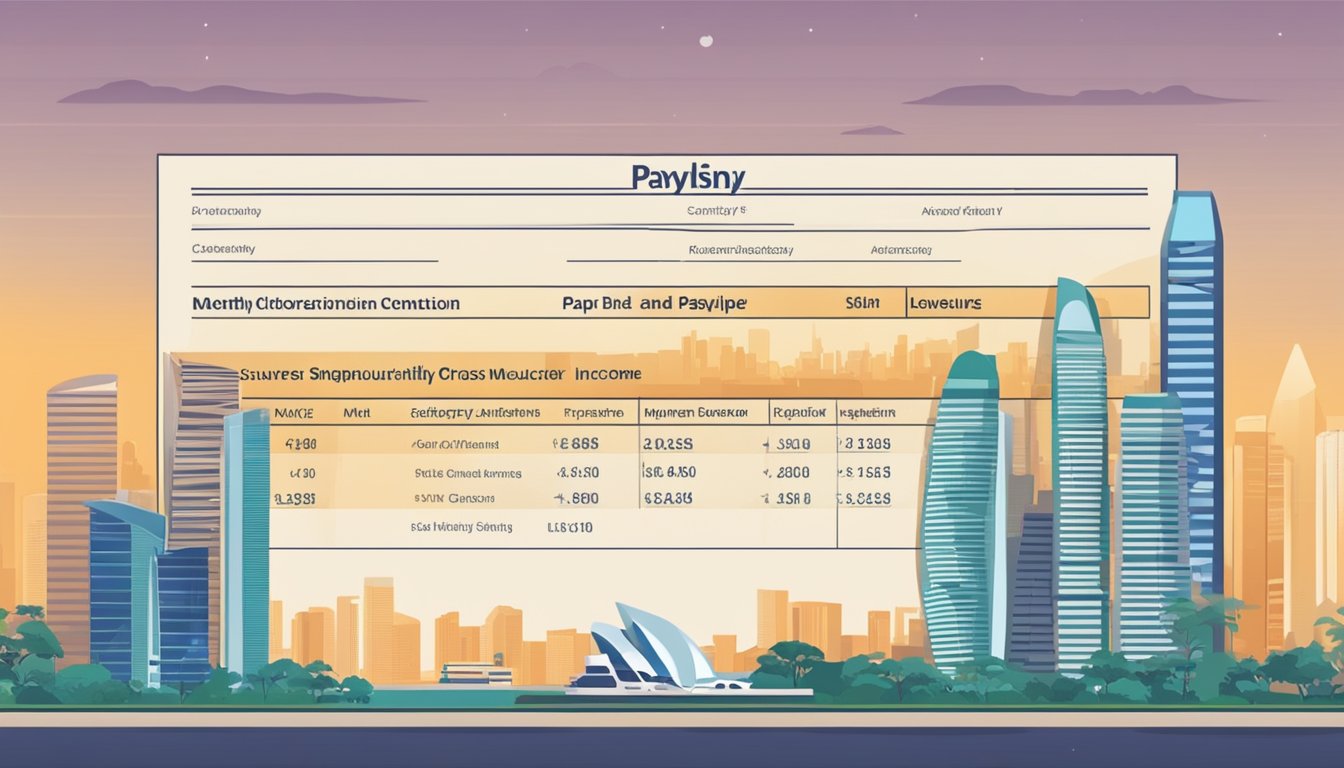Introduction

If you are an employee or a business owner in Singapore, understanding gross monthly income is essential. Gross monthly income refers to the total amount of monthly remuneration received before statutory contributions and personal income tax are deducted. It includes wages, overtime pay, tips, allowances, and commissions, as well as one-twelfth of any annual bonus.
Calculating your gross monthly income is crucial, as it determines your eligibility for certain benefits and services, such as housing loans, credit cards, and insurance policies. It also helps you plan your budget and manage your finances more effectively. In this article, we will provide you with a comprehensive guide to understanding gross monthly income in Singapore, including how to calculate it, the statutory contributions and deductions involved, and the tax implications of gross income.
Understanding Gross Monthly Income
Gross monthly income is the total amount of income earned from employment or business, before any statutory contributions and personal income tax are deducted. It includes all forms of remuneration, such as wages, overtime pay, tips, allowances, and commissions, as well as one-twelfth of any annual bonus. This is the amount that your employer or client pays you for your services or products. It does not take into account any expenses or taxes that you may incur in the process.
Calculating Gross Monthly Income
To calculate your gross monthly income, you need to add up all the income that you have received from your employment or business, including any bonuses or allowances. If you are an employee, your employer will provide you with a payslip that shows your gross monthly income and the deductions made from it. If you are self-employed, you will need to keep track of your income and expenses and calculate your gross monthly income accordingly.
Statutory Contributions and Deductions
In Singapore, both employers and employees are required to make statutory contributions and deductions from their gross monthly income. These include the Central Provident Fund (CPF) contributions, which go towards your retirement, healthcare, and housing needs, as well as the Skills Development Levy (SDL), which funds training and development programs for workers. Other deductions may include income tax, employee insurance, and voluntary contributions to your CPF account.
Key Takeaways
- Gross monthly income refers to the total amount of monthly remuneration received before statutory contributions and personal income tax are deducted.
- To calculate your gross monthly income, you need to add up all the income that you have received from your employment or business, including any bonuses or allowances.
- Statutory contributions and deductions from your gross monthly income include the Central Provident Fund (CPF) contributions, Skills Development Levy (SDL), income tax, employee insurance, and voluntary contributions to your CPF account.
Understanding Gross Monthly Income

When it comes to calculating your income, understanding gross monthly income is crucial. Gross monthly income refers to the total amount of money earned from employment, business, or trade before any deductions are made. This figure is important because it provides an overall picture of your earnings, which is essential when budgeting and planning your finances.
Components of Gross Income
There are several components that make up gross monthly income. These include basic wages, overtime pay, bonuses, and allowances. Commissions and tips can also be included in some cases, depending on the type of work you do.
Basic Wages and Overtime Pay
Basic wages are the fixed amount of money paid to employees on a regular basis. Overtime pay, on the other hand, is the additional amount paid to employees for working beyond their regular working hours. Both of these components are included in gross monthly income.
Bonuses and Allowances
Bonuses and allowances are additional payments made to employees. Bonuses are typically paid annually or semi-annually and can be based on company performance or individual performance. Allowances, on the other hand, are payments made to employees to cover specific expenses such as travel or housing. Both of these components are also included in gross monthly income.
When calculating your gross monthly income, it is important to take into account all of these components. By doing so, you will have a more accurate understanding of your overall earnings. Remember, gross monthly income is the total amount of money earned before any deductions are made, so it is important to keep this in mind when budgeting and planning your finances.
Overall, understanding gross monthly income is essential for anyone looking to get a better handle on their finances. By knowing the components that make up gross monthly income, you can ensure that you are accurately calculating your earnings and making informed decisions about your money.
Calculating Gross Monthly Income

Calculating your gross monthly income is an essential step in managing your finances. It helps you determine your total income before taxes and other deductions. Here’s how you can calculate your gross monthly income in Singapore.
For Employees
If you are an employee, your gross monthly income is the total amount of money you earn before any deductions. This includes your basic salary, bonuses, overtime pay, and any other allowances. To calculate your gross monthly income, you can use the following formula:
Gross monthly income = Monthly wages + Average monthly bonuses and allowances
For example, if your monthly wages are $3,000 and your average monthly bonuses and allowances are $500, your gross monthly income would be $3,500.
For Self-Employed Persons
If you are self-employed, calculating your gross monthly income can be a bit more complicated. Your gross monthly income is the total receipts from your business, minus your monthly business expenses. To calculate your gross monthly income, you can use the following formula:
Gross monthly income = Total receipts – Monthly business expenses
For example, if your total receipts for the month are $10,000 and your monthly business expenses are $3,000, your gross monthly income would be $7,000.
It’s important to note that if you have income from employment and self-employment, you will need to calculate your gross monthly income separately for each source of income.
When calculating your gross monthly income, be sure to include all sources of income and consider any business expenses that can be deducted. This will give you an accurate picture of your financial situation and help you plan your budget accordingly.
Statutory Contributions and Deductions

When it comes to gross monthly income in Singapore, there are various statutory contributions and deductions that you need to be aware of. These contributions and deductions are important to both employees and employers, as they can impact the amount of income earned and the overall cost of employment.
Employee CPF Contributions
One of the most significant statutory contributions is the Central Provident Fund (CPF) contribution. This contribution is mandatory for all employees in Singapore, and it is used to fund retirement, healthcare, and housing needs. As an employee, you are required to contribute a percentage of your gross monthly income to the CPF. The current contribution rates are as follows:
| Age | Ordinary Account (OA) | Special Account (SA) | MediSave Account (MA) |
|---|---|---|---|
| Below 55 | 23% | 6% | 8% |
| 55 and above | 21% | 7.5% | 10% |
Employer CPF Contributions
In addition to employee CPF contributions, employers are also required to contribute to the CPF on behalf of their employees. The employer CPF contribution rates are as follows:
| CPF Contribution | Contribution Rate |
|---|---|
| Ordinary Wages | 17% |
| Additional Wages | 0% to 37% |
It is important to note that the employer CPF contributions are not deducted from the employee’s gross monthly income. Instead, they are paid on top of the employee’s gross monthly income.
Deductions
Apart from CPF contributions, there are other deductions that may be made from an employee’s gross monthly income. These deductions include income tax, employee’s share of CPF contributions, and other voluntary deductions such as insurance premiums or donations.
Overall, understanding the statutory contributions and deductions related to gross monthly income in Singapore is crucial for both employees and employers. By knowing the contribution rates and the deductions that may be made, you can better manage your finances and plan for your retirement and other future needs.
Tax Implications of Gross Income

When it comes to gross monthly income, there are tax implications to consider. Here’s what you need to know about personal income tax and business and trade income taxes in Singapore.
Personal Income Tax
If you’re an employee or self-employed professional, your gross monthly income will be subject to personal income tax. The amount of tax you pay will depend on your income level and the tax rates for the current year. You’ll need to file a tax return with the Inland Revenue Authority of Singapore (IRAS) by April 15th of each year.
Here are the personal income tax rates for the year 2024 in Singapore:
| Chargeable Income | Gross Tax Payable | Income Tax Rate |
|---|---|---|
| First $20,000 | $0 | 0% |
| First $30,000 | $200 | 2% |
| First $40,000 | $550 | 3.5% |
| First $80,000 | $3,350 | 7% |
| First $120,000 | $7,950 | 11.5% |
| First $160,000 | $13,950 | 15% |
| First $200,000 | $21,150 | 18% |
| Above $200,000 | $33,150 | 22% |
Business and Trade Income
If you’re a business owner or trade professional, your gross monthly income will be subject to business and trade income tax. The amount of tax you pay will depend on your net income level and the tax rates for the current year. You’ll need to file a tax return with the IRAS by November 30th of each year.
Here are the business and trade income tax rates for the year 2024 in Singapore:
| Net Income | Tax Rate |
|---|---|
| First $100,000 | 8.5% |
| Next $100,000 | 17% |
| Above $200,000 | 18% |
It’s important to note that if you have investments or loans, the interest income or expenses may affect your taxable income. Additionally, if you have income from renting out property, you’ll need to declare it as rental income and pay taxes on it.
In summary, understanding the tax implications of your gross monthly income is crucial for proper financial planning in Singapore. Make sure to consult with a tax professional or use the resources provided by the IRAS to ensure you’re filing your taxes correctly and taking advantage of any available deductions or credits.
Gross Monthly Income in Context

Understanding gross monthly income is essential to managing your finances and planning for the future. In Singapore, gross monthly income refers to income earned from employment or business ventures before personal income tax and employee Central Provident Fund (CPF) contributions.
Median Gross Monthly Income
The median gross monthly income is the income in the middle after workers are ranked by their income. According to the Singapore Department of Statistics, the median gross monthly income of employed households was $5,800 in 2022. This means that half of the employed households earned more than $5,800, and the other half earned less.
Income Growth and Wage Changes
Over the years, Singapore has seen steady income growth and wage changes. According to the Ministry of Manpower, the annual wage change for the whole economy was 4.1% in 2021. This reflects the gradual increase in wages across different industries and sectors.
It is important to note that gross monthly income is not the same as household income. Monthly household income refers to the total income earned by all members of a household, including income from employment, business ventures, and other sources.
In conclusion, understanding gross monthly income is crucial to managing your finances and planning for the future. By keeping track of your income growth and wage changes, you can make informed decisions about your career and financial goals.
Frequently Asked Questions

What does gross monthly income encompass for employees in Singapore?
Gross monthly income for employees in Singapore encompasses the total amount of monthly remuneration received before personal income tax and employee Central Provident Fund (CPF) contributions are deducted. It includes wages, overtime pay, tips, allowances, commissions, as well as one-twelfth of any annual bonus.
How is gross monthly household income determined?
Gross monthly household income is determined by adding up the total monthly income earned by all working members of a household before deducting personal income tax and employee Central Provident Fund (CPF) contributions. This includes basic salary, overtime pay, bonuses, allowances, and any other forms of income.
In what ways does gross salary differ from basic salary in the Singaporean context?
Gross salary refers to the total amount of salary earned by an employee before any deductions are made for taxes and CPF contributions. Basic salary, on the other hand, refers to the fixed amount of salary that an employee is entitled to receive without any additional payments such as bonuses, overtime pay, or allowances.
Can you explain the calculation method for gross annual income?
To calculate gross annual income, you need to multiply your gross monthly income by 12. This will give you the total amount of income earned in a year before any deductions are made for taxes and CPF contributions.
What’s the current median monthly income for Singapore residents?
According to the Ministry of Manpower, the current median gross monthly income for Singapore residents is $4,534 as of 2022. This means that half of the working population earns more than this amount, while the other half earns less.
How does the Inland Revenue Authority of Singapore (IRAS) define gross monthly income?
The Inland Revenue Authority of Singapore (IRAS) defines gross monthly income as the total amount of income earned by an individual before any deductions are made for taxes and CPF contributions. This includes all forms of income, including salary, bonuses, commissions, and allowances.




